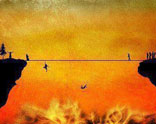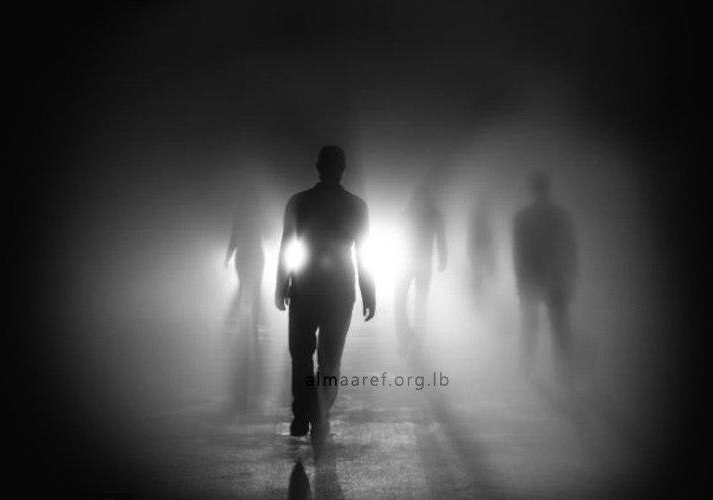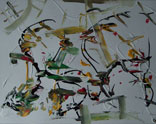Resurrection is the fifth base of the religion to which all the prophets
called and on which all the divine religions agreed. The Qur’anian verses
referring to resurrection and its details are many, to the extent that it is, as
a whole or in details, mentioned in The Noble Qur'an in more than two thousand
verses, as The Scholar Al-Tabatabaei (May his secret be sacred) said.
The Noble Qur'an gives resurrection many names, such as: the Day of Judgment,
the Day of Account, the Last Day, the Day of Resurrection, in addition to tens
of names.
Man’s life does not come to an end by death. There is another and wider world
which can not be measured with this world. There, the human being is going to
stand to see his good and bad deeds; The Most High God says,
﴾Then shall anyone who has done an atom’s weight of good, shall see it!
And anyone who has done an atom’s weight of evil, shall see it!﴿1
What Is Meant by Resurrection
Resurrection means linguistically going back. It is said, “This is his
resurrection time” i.e. this is the time of his going back. Here, we mean by
resurrection restoring the human being, along with his soul and body, and
bringing him alive again on the Day of Judgment for the account, and the reward
and punishment.
The Evidences for the Resurrection
Several evidences can be presented in order to testify the resurrection, among
which we are going to mention the following two:
The First Evidence
The Most Glorified and High God created the human being having the best form. As
the scientists research more, as they come at more of the secrets and wonders of
his creation, whether on the level of his mental powers like the mind and
recognition or others, or on the level of his materialistic and bodily powers.
He, moreover, employed this entire universe, along with its air, water, soil,
plants, animals, sun, moon, and stars for the human being in order to go on his
life.
Here, the following question arises: What is the aim of the creation of the
human being? What is the aim of these finite years which the human being lives?
Are they aimless, with everything coming to an end with his death? If death is
the end, this will imply that our creation in this life only is nonsense and
frivolous. However, The All-Wise does not do what is nonsense and frivolous, He
is far above this.
Henceforth, man’s life is not restricted to the short living in this world, with
him perishing with death and his life recording book being folded forever. He
is, therefore, created for another everlasting world. Living in this world is
but for the sake that the human being cultivate himself by means of faith, the
righteous deed, and the good morals; The Most High God says,
﴾Did ye then think that We had created you in jets, and that ye would not
be brought back to Us (in account)?﴿2
The Second Evidence
One part of the mankind involves good and pious believers who carry out
their duties and do not do injustice to others, and who are characterized with
righteousness and God fearing. On the other hand, there is another part which
involves deniers who do not fully carry out their duties; who do injustice to
others and attach them; and who are characterized with wickedness and
dissolution. Both parts usually do not receive in this world their remuneration
for their good or bad deeds.
Nevertheless, there are people who spend their lives along the path of justice,
righteousness, and obedience to The Most Glorious and Reverent God; at the same
time, they suffer the straits, hardship, tiredness, and pains. Then, they pass
away from this life without having completely received the reward for their
deeds. Even more, there are people who offer everything; reach the utmost extent
in fighting the oppression and the oppressors and in establishing justice;
struggle for the sake of The Most Glorious and Reverent God; sacrifice the soul
for the sake of this sacred path; and then martyrize without having in this
world received anything beneficial to them.
On the other hand, there are people who spend their lives along the path of
oppression, wickedness, and disobedience to The Most Glorified and High God; and
then they pass away from this life without having completely received the
punishment for what their hands committed.
Here arises the following question: Does the mind find it acceptable that this
good doer and that bad doer be treated equally? If there is neither an
afterworld nor a resurrection nor an account, on what basis, then, did the
prophets call the people to the righteousness and obedience and warn them from
dissolution and disobedience?!
The divine justice means that the well doer is to be rewarded and that the bad
doer is to be as much punished as he deserves. Accordingly, it is indispensable
that another world exists, so that the divine justice will be completely
accomplished in it and that the good doer will be rewarded and the bad doer will
be as mush punished as he deserves. This world is the afterworld in which the
good doer and the obedient ones will be distinguished from the bad doers and the
disobedient ones. And then, the righteous ones and the good doers will win the
heaven, receive the reward of their deeds, and live in that everlasting abode
beside the prophets and the Imams and the righteous ones, And how good a
companion they are! On the other hand, the oppressors and the bad doers will
enter the Hell and receive the punishment for their bad deeds, And how woeful
the admitted place is!!
The Noble Qur'an pointed out to this evidence in the Saying of The Most High
God:
﴾Shall We treat those who believe and work deeds of righteousness, the
same as those who do mischief on earth? Shall We treat those who guard against
evil, the same as those who turn aside from the right?﴿
The Most Glorified God says also,
﴾To Him will be your return- of all of you. The promise of God is true
and sure. It is He Who beginneth the process of creation, and repeateth it, that
He may reward with justice those who believe and work righteousness; but those
who reject Him will have draughts of boiling fluids, and a penalty grievous
because they did reject Him﴿
Death
Death is the beginning of the afterworld, so what is its reality: Is it a
beginning or an end? Does only one stage or rather several stages follow death?
The Reality of Death
Death is not a perishing for man’s life; it is the bridge for passing into the
everlasting life, and it implies the soul’s separation from the body. Death, in
fact, is an inevitable issue which is going to happen to every human being,
rather to every soul. The Most High God says,
﴾Every soul shall have a taste of death…﴿
After death, the human being passes into another world, where he is going to
be face to face with his deeds: If they are good, he is going to be rewarded;
but he is going to be punished if they are bad. So he is going to live either in
an everlasting Paradise or in an everlasting Hell.
From the words related in ascription to Imam Al-Hussein (God’s peace bestowed
upon him) in Karbalaa are the following: “Be patient, O Sons of Nobles. Death
is none but an arcade passing you from the misery and adversity to the wide
heavens and everlasting ease. Who from among you hates to move from a prison to
a palace? However, it is for your enemies a move from a palace to a prison and
torture. My father told me in ascription to God’s prophet (God’s prayers and
peace bestowed upon him and his Household) that this world is the prison of the
believer yet the heaven of the disbeliever, and that death is the bridge of the
believers to their heavens yet the bridge of the disbelievers to their Hell. I
have never lied and never been accused of lying.”3
The Death as the Start of the Barzakh
The death is the end of this life and at the same time the start of a new world
called the Barzakh. Linguistically, the Barzakh means the partition between two
things. Here, we mean by it the world coming between this world and the
hereafter world, and the souls remain in the world of the Barzakh till the Day
of Judgment.
The Most High God says,
﴾(In Falsehood will they be) Until, when death comes to one of them,
he says, “O my Lord! Send me back (to life), in order that I may work
righteousness in the things I neglected.” By no means! It is but a word he says.
Before them there is a Partition till the Day they are raised up.﴿4
This holy Qur’anian verse talks about the existence of a scaring life in the
Barzakh for the polytheists.
The Noble Qur'an described as well a happy life in the Barzakh for some
believers from the martyrs in the following Saying of The Most High God:
﴾They rejoice in the bounty provided by God: And with regard to those
left behind, who have not yet joined them (in their bliss), the (Martyrs) glory
in the fact that on them is no fear, nor have they (cause to) grieve.﴿5
The Query in the Grave
When the body of the human being is deposited in the grave, God’s angels come to
him and ask him about his creeds i.e. monotheism, prophecy, and others. It is
obvious that the believer’s answers will differ from the disbeliever’s because
he is an abode of honesty where there is neither cheat nor lying. He who answers
correctly will win peace and comfort in his grave and will be admitted to the
heaven in the hereafter. On the other hand, he who does not answer correctly
will have an abode of torture in his grave and will be admitted to the hell in
the hereafter. Consequently, the world of the Barzakh is either one
manifestation of mercy for the believer or a source of indignation and suffering
for the disbeliever. The human being is to stay in this world till the Day of
Judgment.
The Day of Judgment
The Noble Qur'an elaborately talks in several verses about the signs of the Day
of Judgment, from the collapse and disappearance of the cosmic system, to the
folding up of the sun and the moon, to the snuff and scatter of the stars, to
the explosion of the seas and their boil with fire, to the vanishing of the
mountains, in addition to other events which reveal the vanishing of the present
system and the emergence of a completely new one which is, in its reality, a
manifestation of the Absolute Divine Power. The Most High God says,
﴾One day the earth will be changed to a different earth, and so will
be the heavens and (men) will be marshaled forth, before God, The One, and The
Irresistible.﴿6
After the emergence of all the creatures, the trumpet will be blown twice, at
the first of which every living creature will die except those whom God exempts,
and at the second of which the dead will be brought alive again. The Most High
God says,
﴾The Trumpet will (just) be sounded, when all that are in the heavens and
on earth will swoon, except such as it will please God (to exempt). Then will a
second one be sounded, when, behold, they will be standing and looking on.﴿7
And then, the divine court will start accounting the people for their deeds; and
the recording deed books and the witnesses, from inside and outside the human
being, will bear witness on the Day of Judgment for the deeds he performed in
the first life. The Most Glorious and Reverent God says,
﴾We shall set up scales of justice for the Day of Judgment, so that not a
soul will be dealt with unjustly in the least, and if there be (no more than)
the weight of a mustard seed, We will bring it (to account): and enough are We
to take account.﴿
After the intercession and the division of the two groups i.e. the people of
Heaven and the people of Hell, The Most Glorified and High God will give “The
Praise Banner” to The Noblest Prophet Mohammad (God’s prayers and peace bestowed
upon him and his Household). And then, he will start moving in front of the
people of Heaven towards Heaven, and the believers will drink of the Kawthar
Pond from the hands of The Noblest Prophet and his Household (God’s prayers and
peace bestowed upon them).
May God grant us and you successfulness to the true creeds, the righteous deeds,
and the noble morals, so that we will be granted the happiness in the two abodes
and so that we will drink of the Kawthar from the hands of Mohammad and his
Purified and Impeccable Household (God’s prayers and peace bestowed upon them).
For Reading
Fearing God
Sheikh Al-Soddouq (May God’s Mercy be bestowed upon him) related,
When God’s prophet (God’s prayers and peace bestowed upon him and his Household)
was sitting in the shade of a tree on one too hot day, one man came, took off
his clothes, and started wallowing in the scorching heated earth, thus pressing
his back once, his belly once, and his forehead once [on the earth]; and he was
saying, “O soul, taste… for what is with The Most Glorious and Reverent God
is graver than what I have made you experience.” And God’s prophet (God’s
prayers and peace bestowed upon him and his Household) was looking at what he
was doing.
That man, then, put on his clothes and started moving, so The Prophet (God’s
prayers and peace bestowed upon him and his Household) signaled to him with his
head and called him and said, “O servant of God! I saw you doing something
which I have seen nobody doing before. What made you do what you did?”
[He answered,] “Fearing The Most Glorious and Reverent God made me do so. And I
said to myself, ‘Taste, O my soul, for what is with God is graver than what I
have made you experience.’”
The Prophet (God’s prayers and peace bestowed upon him and his Household) said
to him, “You feared your God as He must be feared. Your God will vie by you
the people of the sky.” And then, he (God’s prayers and peace bestowed upon
him and his Household) said to his companions, “O you who are present, draw
near your companion, so that he will supplicate for you!” They drew near, so
he supplicated for them and said, “O my God! Gather us on what is righteous. Let
God fearing be our supply and the heaven be the place to which we are going to
return!”
1- The
Noble Qur'an/ Al-Zalzala [The Earthquake] Chapter/ Verses 7 and 8
2- The Noble Qur'an/ Al-Mo’minoun [The Believers] Chapter/ Verse 115
3- Bihar Al-Anwar [The Seas of Lights]/ The Scholar Al-Majlisi/ Part Forty Five/
Page 297
4- The Noble Qur'an/ Al-Mo’minoun [The Believers] Chapter/ Verses 99 and 100
5- The Noble Qur'an/ Al- Omran [Omran’s Household] Chapter/ Verse 170
6- The Noble Qur'an/ Ibrahim Chapter/ Verse 48
7- The Noble Qur'an/ Al-Zumar [The Groups] Chapter/ Verse 68



















